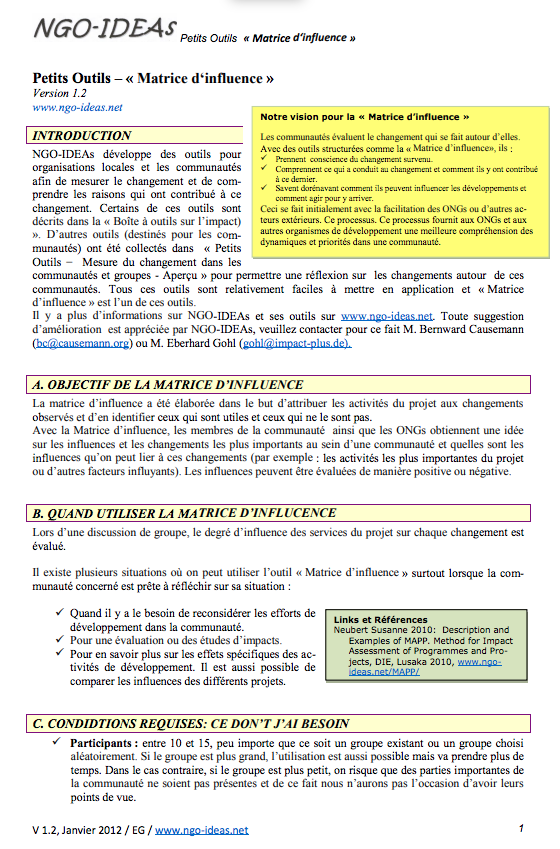Introduction to Tiny Tools – Introduction aux Petits Outils
Evaluators, process consultants and development practitioners alike need to get essential information within a short period of time. In many assignments they also need genuine information from communities. The Tiny Tools are quick participatory tools to find out more about outcomes and impact together with communities. Impact Plus has developed the tools in cooperation with some 50 NGOs on three continents in a contract with NGO-IDEAs and VENRO, the umbrella of German development NGOs.
English publications on Tiny Tools:
- Guide to lifeline /quality of life curve
- Guide to trend analysis
- Guide to activity list
- Guide to influence matrix
Les évaluateurs, les consultants en processus et les praticiens du développement ont tous besoin d’obtenir des informations essentielles en un court laps de temps. Dans de nombreuses missions, ils ont également besoin d’informations authentiques provenant des communautés. Les Tiny Tools sont des outils participatifs rapides permettant d’en savoir plus sur les résultats et les impacts en collaboration avec les communautés. Impact Plus a développé ces outils en coopération avec une cinquantaine d’ONG sur trois continents dans le cadre d’un contrat avec NGO-IDEAs et VENRO, la fédération des ONG de développement allemandes.
Publications françaises sur les petits outils :
- Petits outils ligne de vie
- Petits outils analyse de tendance
- Petits outils liste d’activités
- Petits outils matrice d’influence

Tiny Tools are relatively simple and quick (“tiny”) instruments for group discussion modelled on Participatory Rural Appraisal. Experi-ence shows that these tools increase the process use of consultancies. They lead to new in-sights, mobilise enthusiasm and increase the capacity of communities to bring about further change. They also produce genuine and reliable information for appraisals and evaluation. All combine qualitative and quantitative elements. They generate numbers and narratives.
- Lifeline: In Lifeline participants rate past years on a scale from 1 to 5. This gives a graphic idea of how life changed, and generates narratives about the major development influences.
- Trend Analysis: Trend Analysis rates specific aspects of life over the past years. It shows how different elements of people’s reality change in different ways.
- Activity List: With Activity List communities compare the significance and effectiveness of different activities or projects. The tool generates information about the relative importance and work load of development interventions.
- Influence Matrix: The influence matrix looks both at the change and at the causes for change. The influence of different development interventions on aspects of life is visualised and evaluated.
MAPP
Tiny Tools have their origin in MAPP (Method for Impact Assessment of Projects and Programmes). MAPP combines a number of Participatory Rural Appraisal tools. It explores both changes and causes of change in a community in a very detailed way. It has been frequently used to evaluate NGO, as well as large government programmes, see www.ngo-ideas.net/MAPP .
FAKT has done many studies to the satisfaction of donors and project staff, using MAPP or single Tiny Tools. For a published example of using Trend Analysis in a sector study, see Report “Rural Development Sector Evaluation” http://www.misereor.org/en/cooperation-and-service/evaluation.html. For an overview of more Tiny Tools, see www.ngo-ideas.net/tiny_tools .
Impact Plus has developed the set of tools in cooperation with some 50 NGOs on three continents in a contract with NGO-IDEAs and VENRO, the umbrella of German development NGOs. FAKT associated consultants Eberhard Gohl and Bernward Causemann led the NGO-IDEAs project and developed the Tiny Tools with partners, partly taking them from existing tools (especially MAPP), partly developing new ones.

